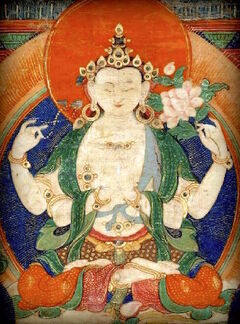Praise of Avalokiteśvara
Praise of Noble Avalokiteśvara
by Bhikṣuṇī Lakṣmī
In the language of India: ārya-avalokiteśvara-stotra
In the language of Tibet: ’phags pa spyan ras gzigs dbang phyug la bstod pa
Homage to the Lord of the World!
Guru of all, you are honoured by the three worlds,
You are lauded by leading gods, Māra and Brahmā,
When praised, you bring the highest victory of a sage—
Supreme lord of the three worlds, to you I pay homage!
Your excellent form contains countless bliss-gone buddhas.
You bear the Buddha Boundless Light at your crown.
Your right hand is bountiful, dispelling the pretas' famine and drought,
And your left is perfectly adorned with a golden lotus.
Your fragrant locks of hair are golden and glistening.
Your broad face is as lovely as the moon.
Your lotus-eyes are supremely beautiful and wide.
Your body is as white as snow or conch and sweetly scented.
You clasp a string of immaculate, gleaming pearls.
You radiate rays of dazzling light, red as the dawn.
Your arms are perfectly poised like lotuses on a lake;
They are youthful and white as autumn clouds.
Your two shoulders are adorned with many jewels.
Your palms are youthful and as supple as a leaf.
Your left breast is draped with a deerskin.
You are adorned with earrings, bracelets and anklets.
You rest upon a supreme, unsullied lotus.
Your navel is as soft as a lotus petal.
Your golden anklets jingle merrily at your feet;[1]
Your supreme golden belt is jewel-encrusted.
Your waist is girdled with a garment of finest cloth.
You transcend the great ocean with the supreme knowledge of a sage.
You have amassed abundant merit and attained pre-eminence.
You banish old age and sickness and are a wellspring of eternal joy.
You bring the three to an end[2] and display celestial action.
You are supreme among the embodied, triumphant over demonic hordes.
You create beauty[3] through the four brahma abodes.
You move with swan-like grace and elephantine majesty.
You have gathered the accumulations and reveal all dharmas.[4]
You liberate from the sea of suffering and ocean of afflictions.[5]
Whoever rises regularly at the break of dawn,
Devotedly brings Lord Avalokiteśvara to mind,
And eulogizes him with these supreme praises
Will, no matter whether they be male or female,
Find that both in this world and in all future lives,
All their needs, mundane and transcendent, are fulfilled!
This concludes the Praise of Noble Avalokiteśvara by Bhikṣuṇī Lakṣmī.
| Translated by Adam Pearcey, 2019, with reference to the commentary of Drakpa Shedrup (grags pa bshad sgrub, 1675–1748).
Bibliography
Primary Sources
grags pa bshad sgrub. "thugs rje chen po'i bstod pa po bstod kyi 'grel pa don bsdus gsal ba bcas" in grags pa bshad sgrub kyi gsung 'bum. (BDRC W1PD90129). Vol. 12: 451–468. Beijing: Krung go'i bod rig pa dpe skrun khang, 2009.
dge slong ma dpal mo. "'phags pa spyan ras gzigs dbang phyug la bstod pa" in bstan 'gyur (dpe bsdur ma). (BDRC W1PD95844). Vol. 37: 555–557. Beijing: Krung go'i bod rig pa'i dpe skrun khang, 1994-2008.
Secondary Sources
Vargas-O'Brian, Ivette M. "The Life of dGe slong ma dPal mo: The Experience of a Leper, Founder of a Fasting Ritual, a Transmitter of Buddhist Teachings on Suffering and Renunciation in Tibetan Religious History." Journal of the International Association of Buddhist Studies 24 2, 2001, pp. 157–185
Wangchen Rinpoche. Buddhist Fasting Practice: The Nyungne Method of Thousand-Armed Cherezig. Ithaca, New York: Snow Lion Publications, 2009.
Version: 1.3-20250303
-
In some versions this line is moved to a later position. See here. ↩
-
According to Drakpa Shedrup, this refers to the three sufferings, i.e., blatant suffering, the suffering of change and the suffering of conditioning. ↩
-
Drakpa Shedrup points out that dben pa, which has the general meaning of seclusion also has an ancient sense of that which is attractive (phangs pa) or appealing (yid du 'ong ba). ↩
-
An alternative version of this line reads: You who have gathered all accumulations and pursue the teachings (tshogs kun nye bar bsags shing bstan pa gnyer ba po). ↩
-
An alternative version of this line reads: You who liberate from the sea of milk and ocean of water ('o ma'i mtsho dang chu yi mtsho las sgrol ba po), where, according to Drakpa Shedrup, the former signifies nirvāṇa and the latter saṃsāra. ↩
